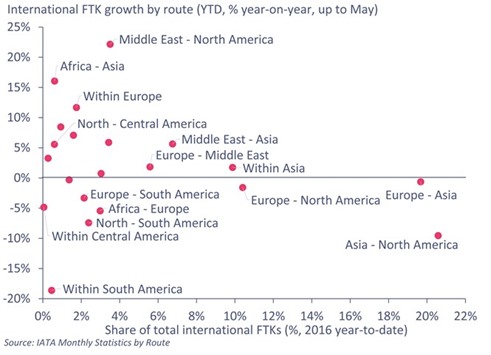Middle Eastern carriers posted the largest increase in air freight volumes of all regions for the 16th consecutive month in June — 8% year-on-year, International Air Transport Association (IATA) said in its latest data.
Capacity increased by 8.7%. Although the leader in market growth, the Middle East’s international freight growth rate (6.5%) for the first six months of 2016 is less than half the 14.3% average growth for the same period in 2015, IATA said.
International freight tonne kilometres (FTKs) flown by Middle Eastern carriers, led by the three big GCC airlines, grew by 6.5% year-on-year in H1, 2016, compared to 14.3% in the same period in 2015.
Around half of this slowdown is accounted for by slower (albeit still rapid) growth on the North America–Middle East route.
But slower growth on the routes between the Middle East and Asia and Europe appears to be more a function of broader weakness in the global demand backdrop.
The three big GCC airlines of the Gulf comprise of Qatar Airways, Emirates and Etihad.
IATA data for global air freight demand in June 2016 showed a rise in freight tonne kilometres (FTK) of 4.3% year-on-year. This was the fastest pace of growth in 14 months.
Freight capacity measured in available freight tonne kilometres (AFTKs) increased by 4.9% year-on-year, keeping yields under downward pressure.
Freight demand increased year-on-year in June across all regions with the exception of Latin America which recorded a 9.8% decrease, compared to the same period last year.
The latest data point to an improvement from the weak conditions seen earlier this year. Q1, 2016 was weak even after allowing for the distortions associated with the timing of Chinese New Year, as well as from the one-off boost to air freight in early-2015 from seaport disruption on the US west coast.
Indeed, there are welcome signs that the modest upward trend in seasonally-adjusted FTKs has finally resumed.
Industry-wide FTKs have grown at an annualised rate of around 3.5% since the start of 2016.
IATA’s director-general and CEO Tony Tyler said, “June saw an improvement in demand for air freight. That’s good news. However, we cannot read too much into one month’s performance.
“Air cargo markets have been in the doldrums for several years during which there were several false starts on indications for improvement. We will continue watching developments closely, keeping in mind that the air freight business environment is fragile. Global economic growth remains sluggish, world trade volumes continue to trend downwards and the industry faces heightened uncertainty in the aftermath of the Brexit vote.”

.

